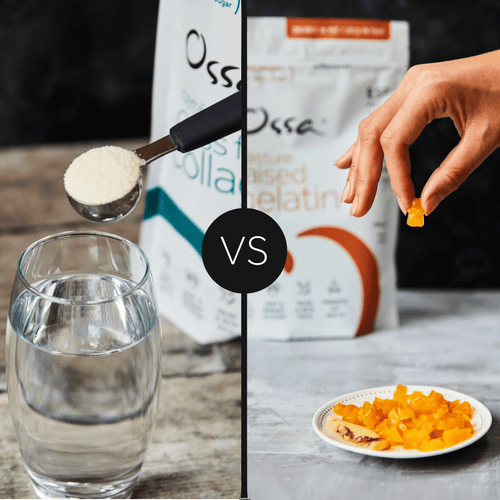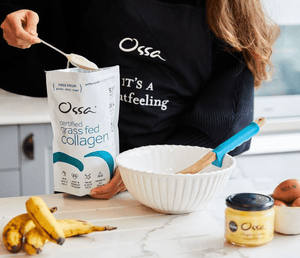When you’re looking into super proteins to enrich your diet, you can’t do better than collagen or gelatine. These are both incredibly powerful supplements that offer benefits for your skin, hair, muscles, and bones.
Before you choose a supplement, it’s a good idea to explore their unique qualities and benefits. While both proteins present a variety of perks, they have key differences that will influence how you use them.

What is collagen?
First, let’s talk about collagen. Collagen is your body’s most abundant naturally occurring protein. It is made of amino acids and the primary structural protein in your body’s connective tissues.
You can also consume collagen as a supplement. Collagen protein that you purchase is bovine collagen, or collagen taken from cows.
Cattle byproducts, mostly bones, are boiled in water. The extract is dried and powdered to put in supplement form. Collagen peptides are the smallest forms of the protein, and they’re extracted from skin, ligaments, and bones.
The amino acids found in collagen, such as glycine, proline, and hydroxyproline, are difficult to find in any other type of food. By taking a supplement, you can give your body the added vitamins, amino acids, and protein you may not get in such a high concentration elsewhere.
What is gelatine?
Gelatine, or gelatin, is actually a form of collagen. It’s been hydrolyzed, which means it’s been broken down in water. This leaves it with a smaller particle composition, but it still contains the same nutrient profile.
What makes them different?
The main difference between collagen and gelatine are their substance and chemical makeup. Collagen is the most natural form of the collagen protein; gelatine has been broken down in water to give it a denser chemical makeup, but it still has plenty of health benefits.
The health benefits are the same for collagen protein and gelatine, but their different molecular structures alter their applications. Collagen is 100% hot and cold soluble, meaning it will mix into whatever you put it into without a problem.
Gelatine, on the other hand, melts when heated and gels when cold. This makes it ideal for recipes like gummies, jellies, and other desserts. But because it forms such a thick gel in cold temperatures, it isn’t the right protein to add to a smoothie or soup. For that, you’d want pure collagen.
Here’s a great gelatine recipe for your own gut-health peach and mango gummies!
And if you want to cook with collagen, try this refreshing green collagen smoothie.
Benefits of Collagen and Gelatine
Because they are the same protein, collagen and gelatine also boast the same benefits. So, if you’re asking why collagen is good for you or why gelatine is good for you, the answers will always be the same.
Let’s take a closer look at some of the greatest benefits from collagen supplements, whether they’re peptides, powder, or gelatine.
1. Healthier, Youthful Skin
Collagen is the protein responsible for skin elasticity. As people age, their bodies naturally produce less collagen, which contributes to the formation of wrinkles and sagging. In addition to slowing down the signs of aging, collagen can also hydrate and nourish your skin exceptionally well.
This leaves you with a long-lasting, youthful glow from an all-natural product.
2. Promote Greater Bone and Joint Health
Because collagen protein is vital in both connective tissue and individual bone and joints, using it as a supplement can help strengthen your entire musculoskeletal system. By building stronger connective tissues, you can help ease stiffness and improve mobility.
As protein also nourishes muscles, a good collagen supplement can promote healthier muscle mass. This makes it easier for you to move with less strain on your bones and joints.
3. Faster Workout Recovery
If you exercise regularly, then you know how important protein is when it comes to recovery. Collagen and gelatine aid muscle repair and growth. This can lead to better and more noticeable results from your workout regime without needing any unnatural or processed supplements.
Instead, by using a naturally occurring protein, you’re giving your body an added boot of what it already produces. This bioavailability makes collagen much safer than processed protein powders and more readily absorbed by your body.
Bear in mind that you should still always follow the recommend dose. Protein builds up in your body, so never take more than a recommended amount. If you have kidney disease or other conditions, consult with your GP before taking any protein or other supplement.
4. Boost Your Immune System
Collagen and gelatine also contain a wide array of vitamins and nutrients, like vitamin C, vitamin D, zinc. The majority of your immune system is located in your gut, so eating collagen protein is the fastest way to benefit your entire body.
By strengthening the connective tissues in your digestive tract, you can ensure that food is broken down, processed, and absorbed more quickly. If there are any foreign bodies, your immune system will be more readily able to fend them off.
5. Improved Hair and Nail Health
Collagen isn’t just for your skin. It also supports the production of keratin, the structural protein that makes up your hair, nails, and skin. If you have dull, brittle, or weak hair and nails, a dose of collagen in your diet could help improve both strength and appearance.





